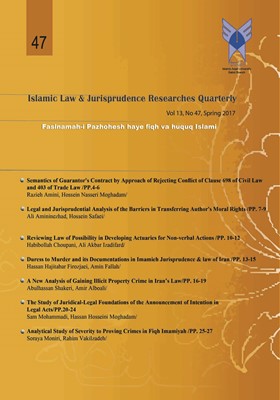Duress to Murder and its Documentations in Imamieh Jurisprudence & law of Iran
Subject Areas : Private lawHassan Hajitabar Firozjaei 1 * , Amin Fallah 2
1 - ssistant Professor of Qaemshahr Branch, Qaemshahr, Iran
2 - Sari Branch, Islamic Azad University, Sari Branch, Islamic Azad University, Sari, Iran
Keywords: Authority, punishment, Criminal Liability, murder, Duress,
Abstract :
Based on rules of Imamieh jurisprudence and Iranian criminal rights (including Article 151 of Islamic Penal Code ratified in 2013), one of the eliminating factors of criminal liability is duress. Duress includes “mental pressure imposed on a person through whom his free will and authority (consent) is waived at the time of committing that behavior”. The present paper discusses determining intentional murder judgment resulting from duress and its documentations in Iranian rights (Articles 375 to 380 of Islamic Penal Code ratified in 2013) and Imamieh jurisprudence. This study concluded that firstly, the failure in elimination of criminal liability from the person subject to reluctance in the status of duress to murder is based on the distinction without reference and principle of human being lives equality. Secondly, the basis of eliminating criminal liability from the person subject to reluctance to murder in the case of being minor or insane is the rule of stronger cause from the foreman. Thirdly, Imamieh jurists’ opinions concerning permission or prohibition of killing in terms of duress to murder are not the same; however, the most well-known idea of Imamieh Jurists and consequently, Islamic Penal Act (IPA) ratified in 2013 is principally based on prohibition of murder in the case of duress to killing.
1- اردبیلی، محمد علی، (1393)، حقوق جزای عمومی، جلد دوم، نشر میزان، تهران، چاپ سی و دوم.
2- انوری، حسن، (1386)، فرهنگ بزرگ سخن، جلد ششم، انتشارات سخن، تهران، چاپ چهارم.
3- جعفری لنگرودی، محمدجعفر، (1346)، ترمینولوژی حقوق، انتشارات ابن سینا، چاپ اول.
4- الحر العاملی، محمد ابن الحسن، (1401)، وسائل الشیعه کتاب القصاص و الدیات، جلد 19، مکتب اسلامیه، تهران، چاپ پنجم.
5- حلی، محقق، (1389) شرایع الاسلام(کتاب قصاص)، جلد 4، الاداب، نجف الاشرف، چاپ پنجم.
6- خمینی، سید روح الله، (1410) ، کتاب البیع، جلد 2، انتشارات اسماعیلیان، تهران، چاپ پنجم.
7- خمینی، سید روح الله، (بی تا)، تحریر الوسیله، جلد 2، انتشارات مطبوعات دارالعلم، قم، چاپ دوم.
8- شامبیاتی، هوشنگ، (1377)، حقوق کیفری اختصاصی، جلد 1، انتشارات ویستار، تهران، چاپ چهارم.
9- شمس ناتری، محمد ابراهیم و همکاران، (1392)، قانون مجازات اسلامی در نظم حقوقی کنونی، جلد اول (حقوق جزای عمومی)، نشر میزان، تهران، چاپ اول.
10- شکری، رضا، قادری، سیروس، (1384)، قانون مجازات اسلامی درنظم حقوق کنونی، نشر مهاجر، تهران، چاپ چهارم.
11- شهید ثانی، الروضه البهیه فی شرح المعه الدمشقیه، ترجمهی: اسدالله لطفی، (1387)، انتشارات مجمع علمی و فرهنگی مجد، چاپ ششم.
12- صفایی، سید حسین، قاسم زاده، سید مرتضی، (1381)، حقوق مدنی(اشخاص و محجورین)، سمت، تهران، چاپ چهارم.
13- طوسی، شیخ ابی جعفر محمد بن الحسن بن علی، (بی تا)، مبسوط، جلد 7، بیجا، مکتب مرتضویه.
14- قبلهای خویی، خلیل، (1380)، قواعد فقه (بخش جزا)، سمت، تهران، چاپ اول.
15- گلدوزیان، ایرج، (1383)، حقوق جزای عمومی، ایران، جلد اول، مؤسسه انتشارات و چاپ دانشگاه تهران تهران، چاپ دوم.
16- مجلسی، محمدباقر، (1403)، بحارالانوار، تحقیق سید ابراهیم میانجی و محمدباقر بهبودی، جلد 55، دارالاحیاء تراث، بیروت، چاپ سوم.
17- مرعشی، سید محمد حسن، (1373)، دیدگاههای نو در حقوق کیفری اسلام، جلد 1، نشر میزان، تهران، چاپ اول.
18- معین، محمد، (1363)، فرهنگ فارسی، جلد یک، انتشارات امیرکبیر، تهران، چاپ دوم.
19- موسوی خویی، سید ابوالقاسم، (بیتا)، مبانی تکلمه منهاج، جلد 2، دارالزهرا، بیروت.
20- میرمحمد صادقی، (1393)، حسین، حقوق کیفری اختصاصی(1) جرایم علیه اشخاص، نشر میزان، تهران، چاپ پانزدهم.
_||_
. Alhor Alameli, M. (1980). Vasaeloshie Ketabol Ghesas Va Aldiat (5th ed). Tehran: Maktab Islamiyeh Publication.
2. Anvari, H. (2007). Big culture of speech (4th ed). Tehran: Sokhan Publication.
3. Ardebili, M. (2014). Law of public penalty. Tehran: Mizan Publication.
4. Gheblei Khoiee, K. (2001). Principles of jurisprudence (penalty section) (7th ed). Tehran: Samt Publication.
5. Goldozian, I. (2004). Law of public penalty of Iran (7th ed). Tehran: Tehran University Publication.
6. Helli, M. (2010). Sharayeol Islam (2nd ed). Tehran: Aladab Najafol Ashraf.
7. Jafari Langroudi, M. (1961). Law terminology (4th ed). Tehran: Ibn Sina Publication.
8. Khomeini, S. (1989). Ketabol Baye (5th ed). Tehran: Esmaeilian Publication.
9. Khomeini, S. (No date). Tahrirol Vasileh (2nd ed). Qom: Darolelm Publication.
10. Majlesi, M. (1981). Beharol Anvar, research of Seyed Ibrahim Mianji and Mohammad Bagher Behboudi (3rd ed). Beirut: Darol Ahya Torath.
11. Marashi, S. (1995). New views in penalty law of Islam (1st ed). Tehran: Mizan Publication.
12. Mir Mohammad, H. (2014). Law of special penalty (1): penalties against people. Tehran: Mizan Publication.
13. Moieen, M. (1984). Farsi dictionary (6th ed). Tehran: Amirkabir Publication.
14. Mousavi Khoei, S. (No date). Mabani Tokalemeh Menhaj (1st ed). Beirut: Daroulzahra.
15. Safayee, S & Ghasemzadeh, S. (2002). Civil law (people and insolvents) (7th ed). Tehran: Samt Publication.
16. Shahid, S. (2008). Alroze Albahih Fi Sharhe Almah Aldameshghieh. Tehran: Publication of Scientific and Cultural Complex of Majd.
17. Shambiati, H. (1998). Law of special penalty (4th ed). Tehran: Vistar Publication.
18. Shams Nateri, M. (2013). Law of Islamic punishments in current legal order(1st ed). Tehran: Mizan Publication.
19. Shokri, R. & Ghaderi, S. (2005). Law of Islamic punishments in current legal order (4nd ed). Tehran: Mohajer Publication.
20. Tousi, S. (No date). Mabsout (3rd ed). Qom: Mortazavieh Maktabah Publication.

